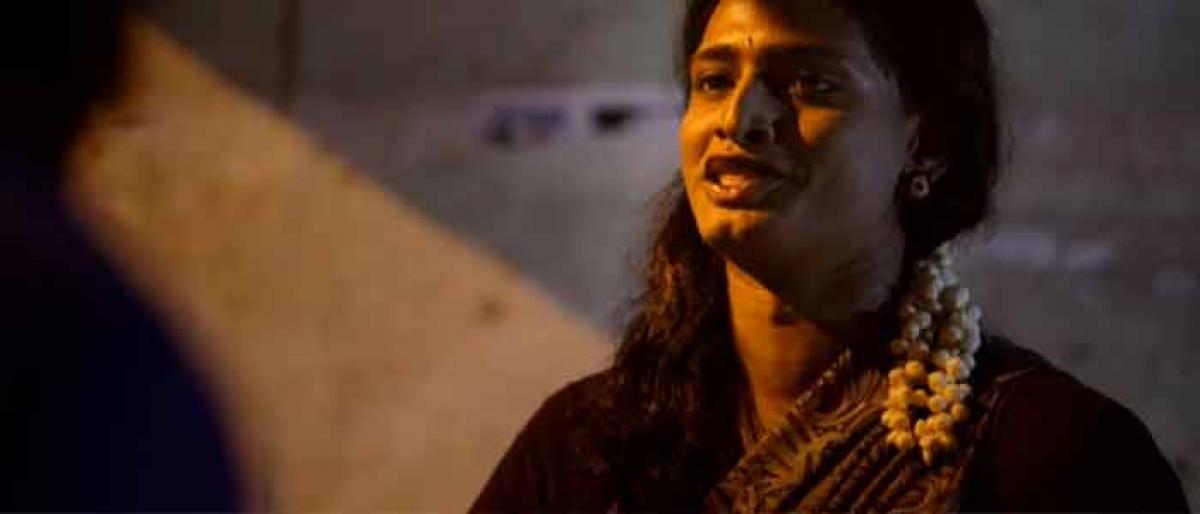Live
- Mangalagiri: TDP NRIs vow to create 1 lakh jobs for youth
- Vijayawada: SAMARTH app useful to effectively monitor law & order issues, says CEO Mukesh Kumar Meena
- Cops bust smartphone smuggling racket, apprehend 17
- Pedal power: City cycling buffs want govt to promote sustainable mobility
- Guntur: Capital Amaravati construction will be speeded up says Nara Lokesh
- Nizam College showcases famed alumni
- 21 nominations accepted for Cantt bypoll
- BJP is a ‘pucca local party’: Kishan
- Voters find Candidates persona non-grata in chevella
- Tirupati: Sanskrit is language of divinity says Jagdeep Dhankhar
Just In

A short film ‘Mr. Nangai’ available on YouTube talks about the travails of transgenders. This it does with the help of gripping screenplay and poignant dialogues, and it has caught the attention of film enthusiasts. The film shows the discrimination face by transgenders in India through an engaging narrative.
A short film ‘Mr. Nangai’ available on YouTube talks about the travails of transgenders. This it does with the help of gripping screenplay and poignant dialogues, and it has caught the attention of film enthusiasts. The film shows the discrimination face by transgenders in India through an engaging narrative.
“Have you seen a transgender begging at a toll Booth or traffic signal and people harassing them? Ever wondered why they can’t go to work instead? P Ashwin Kumar, who has written and directed the 32-minute short film on the struggle of the other gender for survival says that if they would have got an opportunity to study and work, they would not be roaming around begging. Akkai Padmashali, who has chosen to be a transgender, and is inspiring hundreds to fight for Transgender Rights & Justice had rightly tweeted, “Don’t become like us, they told me, if you become like us, there are only two options for you – begging or sex work.”
Despite the social backlash that the transgender community faces today, history tells a different story of the position they occupied in ancient Indian society. The Kama Sutra, written between 200 and 400 BC, refers to the third sex. The Hindu mythology describes half-male forms of Shiva and Mughal courts widely respected eunuchs, employing them as consuls to the king.
Even in art, literature, film and the media, there have been instances of careless distortion of transgender stories. The term LGBT is used interchangeably with the term transgender when, really, it is an umbrella term that includes, but is often irrelevant to trans-discussion. Sexual identity is often confused with gender identity. Not enough people understand that being transgender has nothing to do with sexual orientation. The truth is, what it means to be transgender in 21st century India is vastly different, depending on context.
Coming back to the short film, ‘Mr. Nangai’; lack of inclusive workspaces for transgender was always on Ashwin’s mind and propelled him to do this film. The film has got all the essential ingredients of a feature film. Ashwin calls it a crime thriller and has carefully avoided the documentary style.
In this film the protagonist Ijaz cross dresses as a transgender and understands how difficult it is to lead their life. He is humiliated by men and that forces Ijaz to teach them a lesson. At the end of the film, a group of men harass a helpless transgender and, in the background, Ijaz appears on screen. The director has deliberately left the ending open to signal his interest in coming out with a Part II.
This film may hopefully have great impact on the perception towards transgender in our society. It is now a crime in India to discriminate against any person who has surgically changed their sex. A quota of employment and education opportunities must be given to those in the third gender just like other recognised minority groups. Local governments in India are now required to create accessible public bathrooms to ensure the safety and comfort of third gender. Thus, India will set a human standard for the rest of the world to follow.
“I spent four months with them to understand their lifestyle. Thanks to Kiran amma who is one of the transgender; she has helped me with all information. Every day I used to go with them. I came to know about the rituals including the ‘Thayamma Kai’ (a castration method). I had tears in my eyes on seeing what all they do for livelihood. My queries in the film are genuine. ‘Mr Nangai’ is being screened at several centres in Madurai,” shares Ashwin, the director and writer of this film.
“Section 377 is colonial law. It is an immoral act which adversely affects the community and the right to privacy. Section 377 is an attack on democracy. It has to be repealed. The government must play a sensitive role, one of responsible governance. Successive governments have not been supportive of LGBT rights; we are very disappointed with the State’s attitude towards sexual minorities and gender issues. I strongly stand for what I say; Section 377 has to be deleted,” says Akkai Padmashali.

© 2024 Hyderabad Media House Limited/The Hans India. All rights reserved. Powered by hocalwire.com







